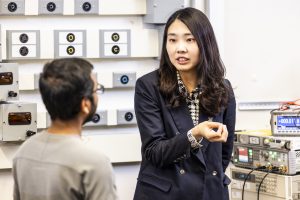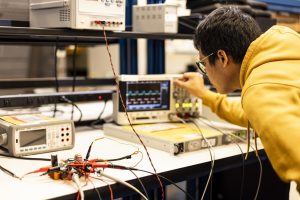
UW ECE Assistant Professor Jungwon Choi’s research focuses on designing power circuits that can receive electrical currents at high frequencies from a charging source and transfer the energy to the battery. Shown above, Choi with UW ECE graduate student Manas Palmal.
Adapted from an article by Brooke Fisher, Photos by Dennis Wise | UW College of Engineering
Imagine rolling into a parking spot and your electric vehicle (EV) automatically begins to charge, quickly and without cables, thanks to a compact charging station on the ground. UW ECE Assistant Professor Jungwon Choi can do more than envision it — she’s developing the technology.
“Charging time is a barrier for people buying EVs,” Choi says. “I’m interested in how we can make more efficient power circuits to charge the battery in electric vehicles.”
To enhance EV charging, Choi is involved in research on many levels. In addition to advancing the design of spiral coils for high-frequency wireless charging — in which power is transmitted electromagnetically between coils located in a vehicle and charging station — her primary research focuses on designing power circuits that can receive electrical currents at high frequencies from a charging source and transfer the energy to the battery.

UW ECE graduate student Ghovindo Surya turns the knob on an oscilloscope to test the electrical currents received by the power circuit.
“We want to have high efficiency,” Choi explains. “When we have 100% power at input and the battery receives only 80% power, then it’s lost as heat. It’s harmful for the system and energy is lost.”
A unique feature of power converters that Choi’s team is working to advance is the two-way flow of energy, which would enable EV batteries to store energy that could be utilized as backup power.
“In an emergency situation, or in case of a blackout, we could draw power from a vehicle into a house,” Choi says.
Learn more about how UW engineering research is driven to advance vehicle electrification on the UW College of Engineering website.

